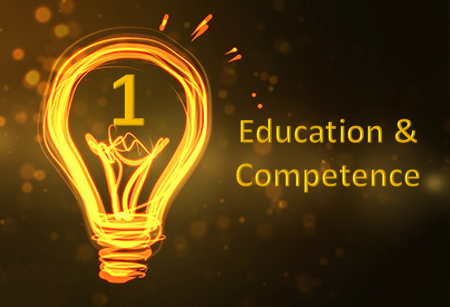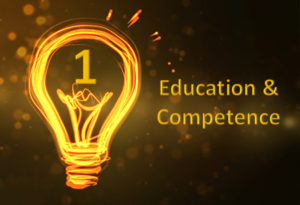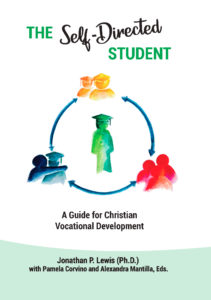The term vocation is often used to signify an occupation. The term calling is mostly used to indicate a sacred call from God to serve others in the organized church or its ministries. There is a tendency today to combine the two into the expression vocational calling. This acknowledges the need that most people feel to engage in work that is meaningful and significant. Although the idea of a calling has been identified as coming from God, the term vocation now includes a secularized concept of calling. Dr. Roger Ebertz of Dubuque University defines it thus:
Vocation is one’s response to a call from beyond oneself to use one’s strengths and gifts to make the world a better place through service, creativity, and leadership.
While there is no direct association in this phrase with God, it is clear that there is there is something beyond us, implicit in finding one’s vocational sweet spot. Donald Miller expresses it this way:
You can call it God or conscience, or you can dismiss it as that intuitive knowing we all have as human beings, as living storytellers; but there is a knowing I feel that guides me toward better stories, toward being a better character. I believe there is a writer outside ourselves, plotting a better story for us, interacting with us, even, and whispering a better story into our consciousness” (Donald Miller, A Million Miles in a Thousand Years, p. 86.)
Christian Vocation and the New Birth
When someone chooses to become a Christian, Jesus declares that they are “born again” (John 3). Accompanying this new birth is the gift of the Spirit of God (Ephesians 4) whose indwelling presence guides the believer in their faith walk. The new birth generates a radical change of heart that is manifested by an altruistic concern for others. This desire to serve and bless others becomes a dominant theme in the life of the believer. “Old things have passed away, behold all things have become new” (2 Corinthians 5:17).
At the new birth, selfish, worldly motivations are replaced by the desire to serve others. This remarkable change of attitude and lifestyle is often the most notable evidence of the new birth. Jesus said that this loving focus on others would be the mark of those who truly follow him (John 13:34-35).
The Motivational Gifts
Beyond this significant change of attitude towards serving others, the Bible also teaches about specific gifting granted for different kinds of service. Romans 12 lists those that some have labeled “motivational gifts” of the Spirit. These include preaching, teaching, helping, counseling, caring for others, managing resources, and leading. While most Biblical scholars conclude that these gifts are needed to support the church in its various organizational expressions, it is my contention that they are equally valid for serving society at large. All vocation is sacred when it is done in the spirit of genuine service to others, “as unto the Lord” (Colossians 3:17,23).
Sanctifying Our Work
Legend has it that that while the Ottoman Turks were breaching the walls of Constantinople in the 15th Century, the monks inside the walls were debating the following: If a fly falls into the Holy water, does the water get contaminated or does the fly get sanctified? While the answer to this unique question may never be resolved, it does seem relevant to our discussion. Not all occupations have sacred ends, but if our service is sacred, does it sanctifies the work? The power to sanctify our “secular” work is our “sacred” attitude—the doing of it “unto the Lord.”
Our God-given gifts are also sanctified by their Giver. For Christians, the search for vocational calling requires a match between the gifting we receive through our genetic makeup at our first birth, with that which is gifted to us at our second birth. Beyond the innate abilities that are genetically imprinted and which we develop as we grow, the Spirit gives us a motivational gift to steer us into service. This is more than “experience” and perceived “strengths.” This gift is given to lead us into specific areas of service in response to our pledge: “Thy Kingdom come, Thy will be done on earth as it is in heaven.”
Getting Started
The Barna Research Institute has done a study on gifting called: Gifted for More: A new framework for equipping Christians to share their abilities and skills in everyday life. The study reveals that while most Christians are aware of latent strengths and abilities, the church does little to encourage people to develop these gifts. And few churches offer spiritual gifts assessments as a regular part of helping people grow in their understanding of how and where they can make their best contribution. Should this change?
There are many tests to determine individual spiritual gifting. Some are more helpful than others. One I have confidence in is called the Motivational Gifts Mix (MGM) inventory produced by Life Outfitter because it incorporates a useful tool to assess one’s character development as well as individual gifting. Understanding gifting is the initial step towards vocational but character development must accompany service to fulfill God’s purposes. Once gifting is identified, its development comes through practice, training, and accountability. This is also what the Self-Directed Student system uses to develop Christian vocation.
Let’s help people get in tune with their gifting and aligned with what God’s purposes. May they develop the attitude that in all they do, they are doing it for the Lord. This attitude sanctifies their work and generates joy and significance, even in the most elemental and routine kinds of work. Sanctifying work generates excellence, and excellence will reap its reward. This reward may or may not generate ample compensation and earthly kudos but more importantly, we can expect a “well done good and faithful servant,” from the Lord and experience his joy (Matt 25:21).
Dr. Jonathan Lewis, (Ph.D. Human Resource Development)



 Christianity places a very high value on relationships and mutual service. When speaking of Christian vocational development, we assume that most Christians are motivated to serve in tangible “high-touch” ways that affect people positively. So, while the volunteer spirit is alive and well among us as a people and many are motivated to serve within their gifting, too often the service rendered is subpar or unproductive due to the lack of a good gift match, or because of a lack of training. Some of us get off to a good start but find ourselves floundering mid-career. If those serving either as unpaid volunteers or paid members of staff are not competent, the whole body suffers. How then do we address the need to develop highly effective servants?
Christianity places a very high value on relationships and mutual service. When speaking of Christian vocational development, we assume that most Christians are motivated to serve in tangible “high-touch” ways that affect people positively. So, while the volunteer spirit is alive and well among us as a people and many are motivated to serve within their gifting, too often the service rendered is subpar or unproductive due to the lack of a good gift match, or because of a lack of training. Some of us get off to a good start but find ourselves floundering mid-career. If those serving either as unpaid volunteers or paid members of staff are not competent, the whole body suffers. How then do we address the need to develop highly effective servants?
